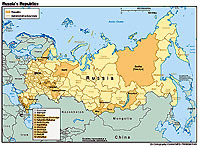‘Honeymoon’ With Opposition Over, Say Russian Pundits

(RIA Novosti – May 29, 2013) The protest staged by the opposition on 6 May 2013 has attracted less attention than the March of Millions on 6 May last year, Russian state news agency RIA Novosti reported on 29 May, quoting an opinion poll. In an interview with the agency a political analyst said that after a “honeymoon” protests are becoming a political exercise.
According to the poll results published on the VTsIOM (Russian Public Opinion Research Centre ) website on the same day (http://wciom.ru/index.php?id=459&uid=114154), 44 per cent of those polled heard about the 6 May protest this year, while last year the number amounted to 52 per cent. Residents of two capital cities, Moscow and St Petersburg are among those who are best informed about the protest (53 per cent).
However, the majority of those who are aware of the protest this year, 72 per cent, cannot remember the slogans under which it was held, the poll showed: 68 per cent of those polled are at a loss when asked to name the slogans, while 4 per cent do not remember a single one. Others mention calls for the authorities to be replaced (6 per cent), as well as slogans like “Down with Putin!” (5 per cent, while last year 18 per cent remembered the slogan) and “For fair elections!” (4 per cent). Three per cent of those polled recollected the slogan “Freedom of political prisoners” and “Raise wages and pensions”, 2 per cent recalled the slogan “Freedom, equality, democracy!” and 1 per cent mentioned “Honest authorities without corruption”. the poll suggested.
As before, the underlying reason behind the protests is believed to be people’s discontent with authorities (21 per cent), but the number of people who voice this reason has become smaller – last year the number amounted to 29 per cent. Such reasons as dissatisfaction with the living standards (the number changed from 14 per cent last year to 10 per cent this year), results of elections (from 11 to 4 per cent) and Putin’s policy (from 6 to 2 per cent) were also mentioned.
The portrait of an average protester has practically not changed: those polled are still inclined to think that people want to express their opinions about the authorities’ policy (50 per cent). Others are confident that protesters are paid to take part in opposition marches and rallies (29 per cent) or have a lot of time to spare (23 per cent). Eleven per cent of those polled think that protesters are made to take to the streets, while 6 per cent of people describe protesters as mentally unstable.
Average supporters of protests do not change dramatically either, the results show. One year ago 25 per cent of those polled backed the protesters, while this year the number is 27 per cent. Yet, not more than 7 per cent are still prepared to take part in opposition protests. Approximately one third of respondents, 35 per cent, treat protests with indifference, while 32 per cent take a negative view.
Thirty per cent of Russians believe that opposition rallies will take place in the future but they will be less large-scale and conspicuous, while 19 per cent believe that the peak of their popularity is left behind and another 23 per cent of those polled reckon that their popularity will grow, the poll showed.
The poll was conducted among 1,600 people in 130 town and villages in 42 Russian regions between 18 and 19 May. Margin of error does not exceed 3.4 per cent.
Commenting on the results of the poll, Russian political analysts say protests are becoming a regular political exercise, this is why they are less and less popular, the agency said. Aleksey Mukhin, the director of the Political Information Centre, believes “the honeymoon is over”, saying opposition leaders are unable to generate a positive agenda and use the theses that are no longer working. This is why the number of people who believe that opposition leaders are rather engaged in spin and show ambitions for power than stand up for justice is becoming higher. “Some disappointment is obvious,” Mukhin believes.
Political analyst Mikhail Remizov links the decrease of interest in the protests to the lower amount of politicization in society – last year the presidential election was fresh in mind, hence the “protest boom”, he said.
“The protests no longer cause wide-scale public response,” Remizov went on to say, “because they have turned into a political exercise” and not a political event. “Numbers are not the most important things now, because they cannot be directly converted into effectiveness,” he said. However, in general, the contingent of participants remains the same, both experts agreed. Says Mukhin: “The forecast, made by an opposition leader, is coming true: ‘You will attend rallies the way you go to work'”.
